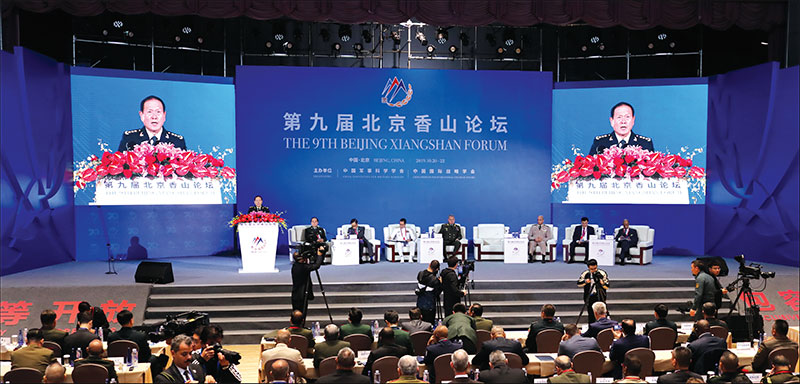China and Russia put the focus on both ASEAN and Asia-Pacific
Pravin Sawhney | Beijing
The 9th Beijing Xiangshan Forum held recently in China is the only global annual congregation which is military-led — in this case, the People’s Liberation Army (PLA). Started in 2006, this year, it recorded participation of 650 delegates, representatives from 68 countries, eight international organisation, and select defence and military experts. The subject this year was ‘Maintaining International Order and Promoting Peace in the Asia-Pacific.’

The Forum sent out two clear messages. The first one directed at the United States was that both China and Russia stand together and firm against the lone superpower’s hegemonic tendencies. In an exceptional format with two keynote addresses rather than one, the Chinese and Russian defence ministers, in their individual styles, rejected the US-led international order and the security architecture for the Asia Pacific region. The Russian defence minister, Gen. Sergei Shoigu, with tone reminiscent of the Cold War made a frontal assault, while his Chinese counterpart Gen. Wei Fenghe, displaying strategic patience, spoke of win-win cooperation even as he drew China’s red lines which he said were sacrosanct.
Gen. Shoigu said that by rejecting the Intermediate-Range Nuclear Forces (INF) treaty, the US wanted to contain China and Russia. He made it known that China and Russia had expanded mutual trade and technology partnership. He was referring to the ‘comprehensive strategic partnership of coordination for a new era,’ which has evolved to include fifth generation telecommunications, artificial intelligence, biotechnology and digital economy. Since the US has labelled both countries as its foes, China and Russia are jointly developing indigenous replacements for foreign, particularly US technologies, from semi-conductors to operating systems.
According to Gen. Shoigu, Russia and China had planned more military exercises. He confirmed, what President Putin has declared, that Russia and China were jointly developing an anti-missile system. While blasting the US Indo-Pacific security architecture in Asia (next article), he offered security cooperation to all nations in the region.
Commenting on relations with the US, he said that the US-Russian military relations were incredibly low. To improve ties the existing INF treaty should remain in force since there are no treaties to replace it. Russia was willing for talks to strengthen security since the situation was volatile. He also said that Strategic Arms Reduction Treaty (START) should be extended.
Gen Wei, adopting the Chinese style of avoiding direct confrontation, underscored China’s red lines on which no compromise was acceptable. China, he said, was the only major power, which had yet to be re-united. “The (Chinese) people want it and no force can stop China’s unification’ he said, adding, ‘South China Sea is a part of our territory and no inch of land left by our ancestors would be given up.” To assuage ruffled feathers, he said that China had no expansionist and aggressive designs. “We believe that however strong China may become, it will never seek hegemony or sphere of influence.”
His second red line was that “no force can stop Chinese people and nation from marching forward,” suggesting that attempts to contain China would boomerang and lead to conflict. He said that China would always keep ‘United Nations at the core and seek peaceful development’ His added that since China followed, “Active defence strategy, it would not attack first, but will surely counter-attack if attacked.”
You must be logged in to view this content.

